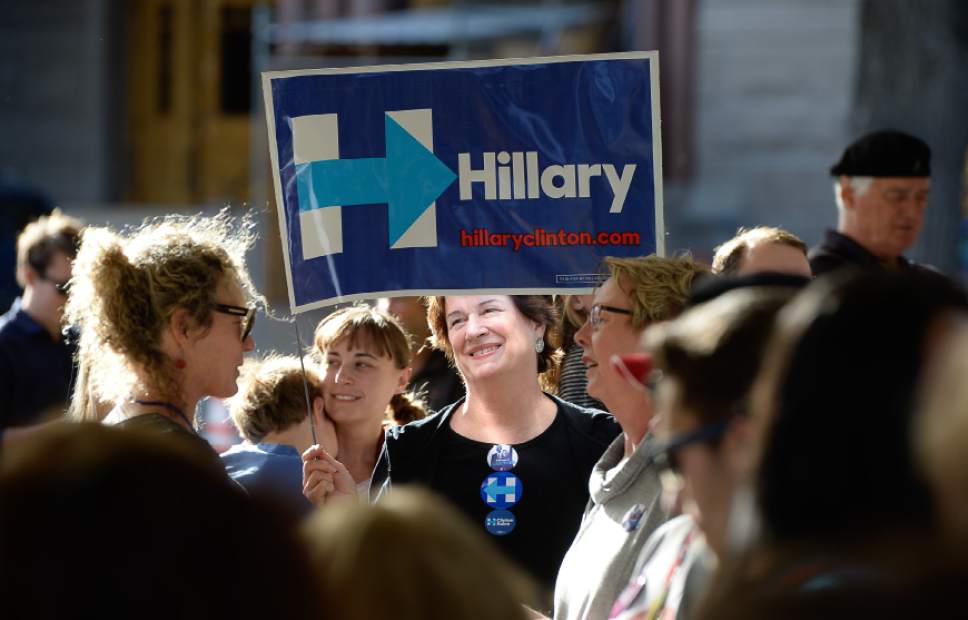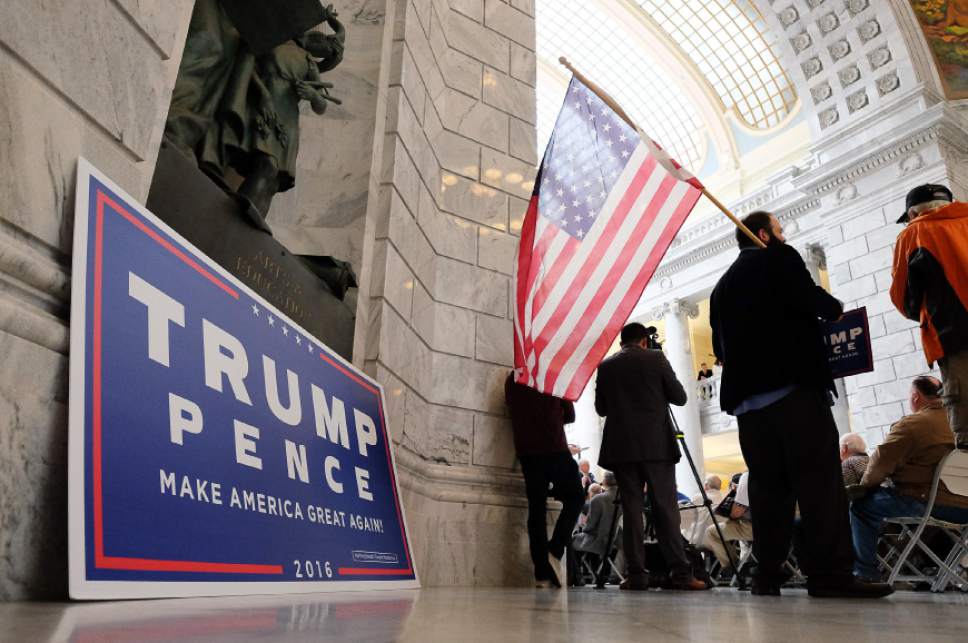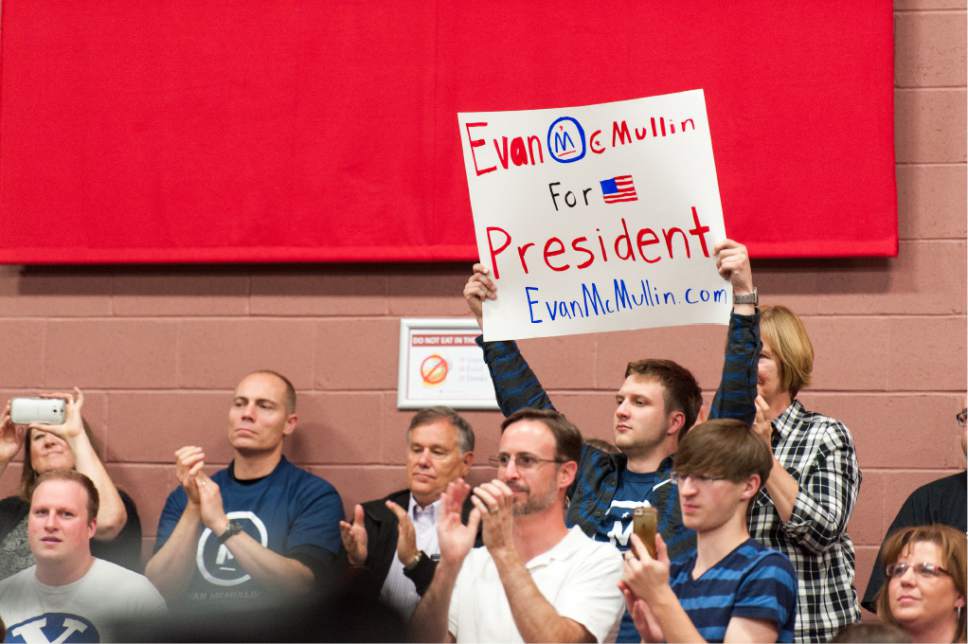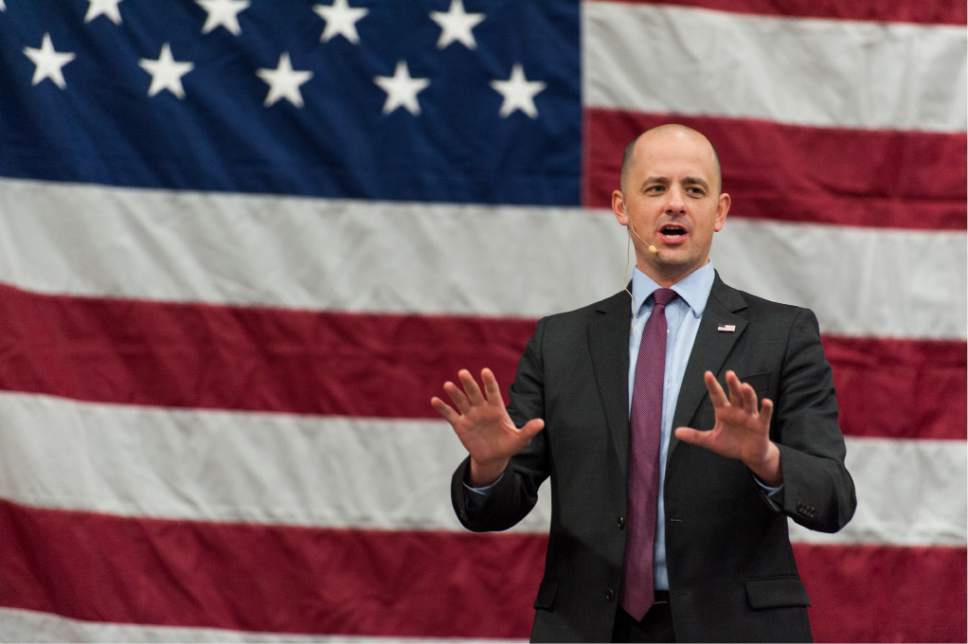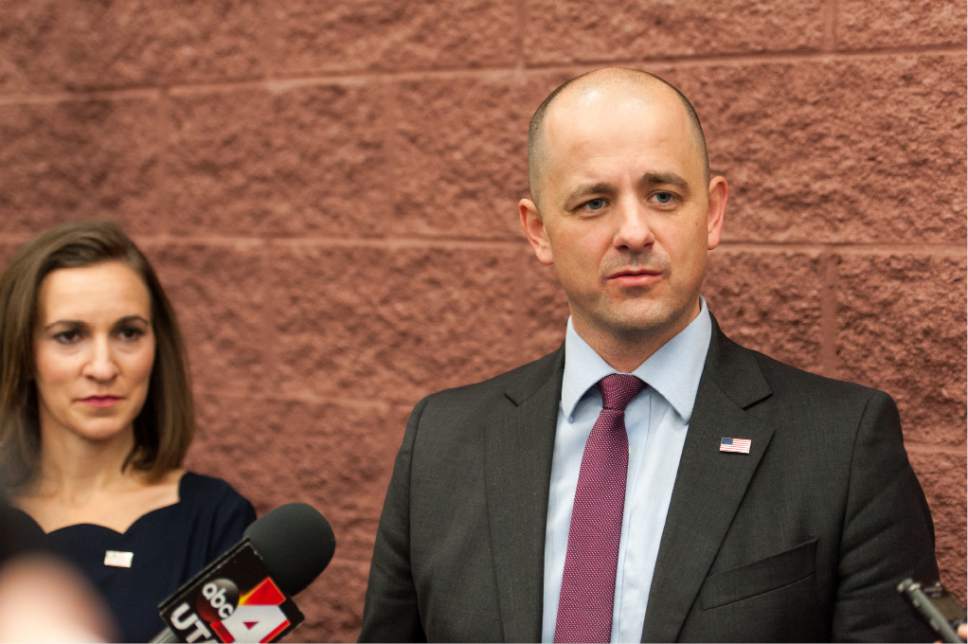This is an archived article that was published on sltrib.com in 2016, and information in the article may be outdated. It is provided only for personal research purposes and may not be reprinted.
Fast-forward just a few days to election night and as early returns from the East Coast pour in, the results are breaking in favor of Donald Trump.
The Republican presidential nominee's sometimes home state of Florida, a dogfight for weeks, goes his way. He hangs onto leads in Ohio and Iowa, and his flurry of late campaigning manages to wrestle New Hampshire into his column.
Trump's tenuous path to the Oval Office is suddenly looking much more plausible. But his New York victory party is on hold. Early results from Utah show Trump in a nail-biter with insurgent conservative candidate Evan McMullin, a contest that seesaws for weeks, sparking legal battles to determine the next commander in chief.
It boils down to this: Based on battleground polls mere days before the election, Trump has just a handful of realistic ways to win enough states to capture the 270 electoral votes to win the White House. And they largely rely on his capturing Utah.
The crimson-red conservative state, which hasn't gone blue since Lyndon Johnson trounced Barry Goldwater in 1964, could at the very least deal a blow to Trump's chances or potentially throw a disputed election into the U.S. House for the first time since 1825. If Hillary Clinton doesn't win Utah — and her campaign has never seen it as a likely pickup — she would still need to rack up the 270 electoral votes in other states to win the presidency.
"[Utah] is essentially playing an even more important role as the polls are tight. So the chance of Utah being a tipping-point state are higher," said Benjamin Morris, an analyst from the data-driven politics website FiveThirtyEight.com, which has been running thousands of electoral simulations every day leading up to the final vote. "The chances for the election coming down to the margin of Utah's six electoral votes are going up at the moment."
Morris notes, however, that the latest polls have shown Trump opening some daylight in Utah between himself, McMullin and Clinton. That means the independent candidate's chances of pulling off an upset in the Beehive State may be dwindling.
Much has been written about Clinton's electoral edge. But if Trump has a similar firewall, his back is against it — and Utah is one of the potentially shaky bricks in the barrier.
The campaigns are certainly aware of the electoral math.
GOP vice presidential nominee Mike Pence made a stop recently to rally supporters in Utah, making the case it's time for Republicans to "come home" and that a vote for McMullin is essentially a vote to make Clinton the nation's first female president and its 45th overall. A few days later, elected GOP officials gathered in the Utah Capitol to drive home the point.
McMullin has been staging multiple town halls in Utah to pry away voters from Clinton and Trump, arguing that, if the election is close Tuesday, a vote for him could deny the two major party candidates — both widely despised in the Beehive State — the needed electoral votes and toss the election to the House.
Clinton surrogates have been hitting Utah as well. Anne Holton, wife of vice presidential nominee Tim Kaine, actor Sean Astin and others have urged Utahns to vote early and vote Clinton.
Pro-Clinton political-action committees (PACs) are pumping money into television ads in the state — if not to push the Democrat over the top, at least to cut the legs out from under Trump and perhaps force his cash-strapped campaign to dedicate resources to hold a usually reliably red state.
The anti-Trump Truth PAC has begun airing TV spots highlighting the GOP nominee's call for a ban on Muslim immigrants and asking Utah's predominantly Mormon voters how other religions might fare under a President Trump.
"The Mormons have been persecuted terribly in the past, and I thought they might find problems with a man who calls for excluding an entire religion from the United States," said Dick Brass, a former Microsoft and Oracle executive who is paying for the ads.
A similar ad targets Jewish voters in Florida.
"There are parallels in the persecution between the two faiths. Hitler called for extermination of the Jews and the governor of Missouri called for the extermination of Mormons," Brass explained.
"Clinton is a mildly flawed but capable politician, with the experience in the Senate and the State Department and also the White House. Trump is a failed businessman pretending to be a billionaire, a liar, a bigot and, I think, America's first fascist candidate."
PACs supporting Trump are responding in kind. The pro-Trump 45 Committee, for example, has bought nearly $200,000 of airtime on Utah TV stations for the homestretch to hammer Clinton.
None of this shows Utah is the most pivotal state in the election. Indeed, Clinton and Trump are focusing the bulk of their resources on traditional battlegrounds of Ohio, Pennsylvania and Florida and other richer prizes such as North Carolina, Colorado and Michigan.
But Morris says that while other states are more likely to decide the outcome, "[Utah's] chances of sending the election to the House are greater than any state, because it's the only state a third-party candidate can win."
Indeed, no third-party candidate has won any electoral votes since George Wallace running on a segregationist platform in 1968.
The only other time the state could have played a significant role came in 2000 — the showdown between George W. Bush and Al Gore — when every state mattered. But Utah's outcome was never in doubt.
It is a level of drama and national significance that hasn't been witnessed in the lifetime of many voters and may not be seen for decades to come.
About a million people are expected to cast ballots in Utah's presidential chase. With Trump leading by about 7 percentage points in the most recent polling, that means a cushion of 70,000 voters.
Or, looked at another way, the next president could be determined by whether about 35,000 Utahns change their minds.
Here are a few of the scenarios — some more likely than others — in which Utah could factor prominently in the quest to reach 270.
The most likely puts Florida — again — center stage. If Trump prevails in the toss-ups of Florida and Nevada, peels off North Carolina and New Hampshire, and locks up all of the states where he currently leads, he would be sitting with 264 electoral votes.
In that instance, a Trump victory in Utah would put him over the top. An upset by either McMullin or Clinton would send the election to the House.
A Republican-led House would most likely side with Trump, although McMullin contends disdain for both major-party hopefuls makes him a compromise choice.
Colorado, with nine electoral votes, also could factor into the equation. If Trump musters a win there and in Florida and New Hampshire, he could lose Nevada or Utah — but not both — and get to 272 electoral votes.
Losing Florida would complicate Trump's path dramatically. He would have to make up 29 electoral votes, meaning he would need a significant upset in Pennsylvania, and rack up Nevada, New Hampshire and Utah just to tie at 269.
One last possibility — and it appears to be more remote — would occur if Trump takes Florida and Wisconsin, a state where Republicans believe they have a chance but trail in recent surveys. That would require Clinton to win Nevada, Colorado and, yes, Utah, to become the next president.
None of this may matter. If the latest polls are on target, Clinton will become the next president.
— Tribune reporter Thomas Burr contributed to this story.
gehrke@sltrib.com Twitter: @RobertGehrke


